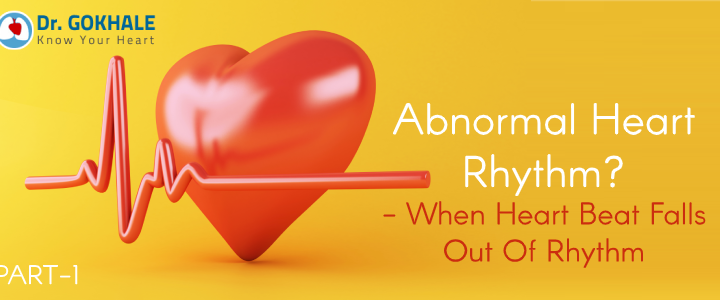What is Abnormal Heart Rhythm? – When Heart Beat Falls Out of Rhythm: – Part 1
Abnormal heart rhythm is a condition where the heartbeat occasionally falls out of rhythm. It can feel like a heart’s fluttering or beating too fast or too slow than the normal rate: signs of abnormal heart rhythm. Called as Heart Arrhythmias, this abnormal heart rhythm condition can carry a life-threatening heart risk or can sometimes stay silent and you don’t feel anything at all.
Heart Beat & Abnormal Heart Rhythm:
A group of cells in the heart called the cardiac conduction system sends out electrical impulses through sinus node, natural pacemaker located in the right upper chamber of the heart. These electrical impulses through sinus node start the heartbeat by pumping the blood into lower heart chambers.
As the ventricles are filled with blood, the electrical impulses arrive at the ventricle contracting it to pump this blood to the lungs or other parts of the body. Everything goes smoothly and heartbeats at the rate of 60-100 beats per minute depending upon the activity level.
What causes an abnormal heart rhythm?
There are many possible causes of abnormal heart rhythms that include heart attack, blocked arteries, high blood pressure, diabetes, cardiomyopathy, scarred heart tissues caused by a prior heart attack, overactive or underactive thyroid glands, stress or anxiety or even genetics.
Types of Arrhythmia:
The speed and rhythm of each heartbeat are controlled by the said electrical impulses. A heartbeat of the patient may fall out of rhythm when these electrical impulses travel in a different direction than normal causing arrhythmia.
There are two general types of arrhythmia depending on how they affect the heart:
Tachycardia: Faster heartbeat – when the heart beats faster than 100 beats/minute.
Bradycardia: Slower heartbeat – when the heart beats slower than 60 beats/minute.
This is only a general classification and it doesn’t mean all faster or slower heartbeats are arrhythmias. Sometimes a high activity can cause faster heartbeat and deep sleep can cause a slower heartbeat in relaxed states.
Going further, arrhythmias are again classified depending upon where the abnormal heart rhythm originates:
Common types of Tachycardia originating in Atria (upper heart chamber):
Atrial fibrillation: Chaotic electrical impulses originated in atria cause weak and rapid contractions in atria, further causing irregular ventricular rhythms resulting in rapid heart rate. This condition can be temporary or sometimes it doesn’t end until treated by a heart specialist.
Atrial flutter: Rapid heartbeat similar to fibrillation but the heart flutter in a less chaotic way compared to fibrillation. It also carries the risk of heart stroke just like fibrillation.
Supraventricular tachycardia: This is an umbrella term for all the abnormal heart rhythms originating in the upper chamber or AV node.
Common Tachycardias occurring in the ventricles:
Ventricular Tachycardia: Rapid and regular heartbeat that is caused due to abnormal electrical impulses originating in ventricles. These abnormal impulses cause inefficient pumping of blood and this can lead to a serious medical emergency when this happens with a weak heart.
Ventricular Fibrillation: Similar to the above condition the fibrillation causes the ventricles to quiver leading to inefficient pumping of blood. Fibrillation can be fatal if it is not treated by a heart specialist within minutes.
Bradycardia:
A slow heartbeat need not always be Bradycardia. But if your heartbeat is slow and your heart is failing to pump sufficient blood than such a problem can be sign of abnormal heart rhythm that falls under Bradycardia. Two common types of Bradycardia:
Sick Sinus Syndrome: When the sinus node which is the natural pacemaker of our heart doesn’t send electrical impulses properly, the heart rate may fall off the rhythm. This condition is mostly found in older adults.
Conduction block: The electrical impulse travel from atria to ventricles through the AV node, which when suffers a blockage can result in disrupted heart rhythms.
While we have briefly discussed about the causes & types of abnormal heart rhythms, our next blog post will give you more information on signs and symptoms of abnormal heart rhythm, treatment option, and tips to reduce abnormal heart rhythms.
 Ask Doctor
Ask Doctor
